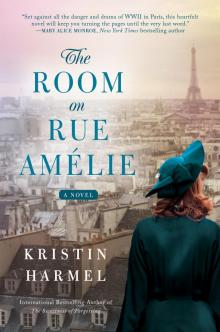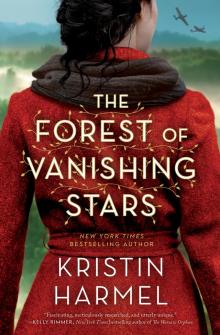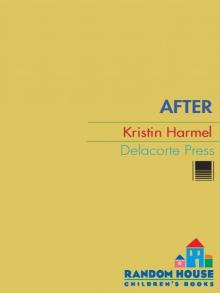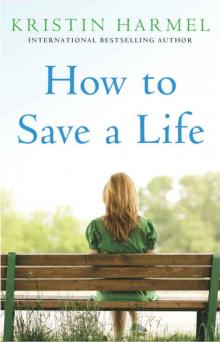- Home
- Kristin Harmel
The Forest of Vanishing Stars Page 23
The Forest of Vanishing Stars Read online
Page 23
She slowed to a brisk walk on the main street, so as not to arouse suspicion. What was her plan here? She slowed slightly as she neared the church. She would go to one of the stained glass windows near the altar and peer in; there was a side door to the church with a particularly translucent pane, the flesh tones of Jesus’s mother. If she pressed her face against the glass, she should be able to see inside, though the view would be hazy. It would be enough, though, to count eight nuns, seated and alive. She would then rush back to Jüttner’s home before he discovered her missing, and there she would agonize about her next move. She would need to be ready to flee to the forest the moment the nuns were safe.
Just before she rounded the corner into the small square outside the church, she heard raised voices and froze. It took her a few beats to recognize one of them as Jüttner’s, his words a sharp, threatening hammer of anger. She was too far away to make out what he was saying, but as she crept forward for a glimpse of the argument, hugging the shadows as she went, she could see him standing just outside the church door with a cowering Schneider, poking a finger at the other man’s meaty nose as he yelled about something. Schneider’s face was red, and he was attempting to get a word in, but Jüttner kept going, rolling furiously over him.
Yona bit her lip and slipped backward, letting the shadows swallow her. Something was wrong. Her heart pounding rapidly, Yona hurried up the narrow street, doubled back down an alley, and crept toward the door of the church near the altar. She would just glance in, reassure herself about the nuns’ safety, and then depart as quickly as she’d come.
There was no guard at the side door, which didn’t surprise Yona; there hadn’t been a guard posted here the last few times, either, and Yona had assumed that the door had been locked. What she didn’t expect to see was an unguarded door that had been left slightly ajar. The tempo of her heartbeat quickened.
She hesitated before slipping inside, as quiet as a breeze. The church was silent and dark, and in the stillness, Yona smelled the blood and the spent bullets before she saw the bodies. She clapped a hand over her mouth as her eyes adjusted to the dim lighting. There on the altar, lined up in a neat row, lying on their backs, were seven of the eight nuns, bullet holes in their heads, their open eyes looking sightlessly up toward God. The eighth nun was just a few feet away, on her knees and slumped to her right, facing the crucifix above the altar, a bullet hole in her back. She had died in prayer, staring up at Jesus. Yona knew before she approached and gently turned the body over that it was Sister Maria Andrzeja.
The kind nun’s eyes were open and empty, her lips just slightly parted. Yona could imagine her whispering to God, quickly saying her final words, even as the other gunshots rang out. Or had Sister Maria Andrzeja been the first to die?
“I’m so sorry,” Yona whispered, but there was no forgiveness in the nun’s lined face, no absolution in her eyes. She wasn’t here anymore; her soul had already flown. The dove on Yona’s wrist throbbed as Yona bent quickly to kiss the nun’s cold forehead. With the palm of her hand, she gently closed Sister Maria Andrzeja’s eyes and stood frozen for a few seconds. Then she straightened and put her hand over her mouth again as she looked at the seven other nuns, forever silent now. She backed away and said a quiet prayer in the darkness, then she slipped out the way she’d come and gulped the fresh air outside. She could still hear Jüttner’s raised, angry voice coming from the church’s front steps, and she knew this hadn’t been what he’d wanted.
He had tried to stop the execution, but perhaps the end had always been inevitable. Yona had been fooling herself in believing she could make any difference.
But she could still help the group in the woods.
Jüttner had said that the plans to enter the forest were already well underway, but what if it wasn’t too late to do something? Whoever saves a life, it is considered as if he saved an entire world. She could still hear the quote from the Talmud in Sister Maria Andrzeja’s soft, gentle voice. As she turned and walked quickly away, trying her hardest to look casual and nonchalant instead of like a sobbing mess, Jüttner’s voice faded behind her, and she moved away from the past forever.
She knew she would never see him again.
* * *
Twenty minutes later, Yona reentered Jüttner’s house through the back door, changed into her own dress and sturdy boots, and grabbed what she could from the dead girl’s closet: two pairs of shoes, a dozen socks, two sweaters, and a beautiful red wool coat that was impractically bright for the forest but would provide much-needed protection against the freezing winter. She went back out the way she came, and, wiping away tears that wouldn’t stop, she strode quickly along the road leading to the farmhouse near the forest’s edge, the one with the red window frames and the eagle with the clipped wing. She had to make sure Anka was safe before she left the town forever. It would bring her peace to know that amid the madness at least one life had been saved, that one of Sister Maria Andrzeja’s last acts could be her legacy.
“Halt!” A voice rang out from the side of the road, and a German soldier stepped into her path, a few crumbs hanging from the corners of his narrow lips. He’d been eating as she approached, a clear dereliction of his duty, and his startlement upon seeing her was obvious. It took her only a second to register that it was the same German she’d encountered on her way back into town three days earlier, and he seemed to realize the same thing a few beats later. “Ah, it’s you,” he said in his smooth Belorussian. “You’re after more milk for your daughter?”
She mustered an embarrassed smile, which served to hide her relief. He hadn’t been there in the square that day when she announced herself to Jüttner; he didn’t know that she was anything but a simple villager. “She is very hungry, sir.” She bowed her head and added, “Thank you for the chocolate.”
When she looked back up at him, his pale blue eyes were deep wells of despair. “It is not something to be mentioned. I wish I had more to give you.”
She glanced at the remnant of his hunk of bread, lying by the side of the road, half eaten. He followed her eyes and then met her gaze, guilt with an edge of annoyance etched in the creases of his face. “I’m hungry, too, you see.”
He looked perfectly well-fed, and though she appreciated his kindness with the chocolate, she saw it now for what it was: a way for him to sleep at night, to pretend to himself he’d made a difference. “I’m sorry to ask again, sir,” she said, coating her words with honey so he wouldn’t hear the venom or the sadness. “But might I pass? I just need to feed my child.”
He frowned down at her. “You have money this time? For the milk?”
She hesitated. “A bit.”
He licked his lips, catching the crumbs. For a moment, she thought he was going to demand that she produce the cash, which of course she couldn’t do, because there was none. Instead, he merely nodded and stepped aside. “I’ll see you when you come back this way.”
She nodded. “I might be a while. You see, I don’t have much, and I will need to bargain with the farmers.”
He nodded and raised his eyebrows, his mouth twisting into a knowing smirk. He looked her up and down, appraising her, no doubt wondering what else she might have to trade. She hated him for the implication.
“I see,” he said, now openly leering at her.
She forced a blank smile. “I’ll see you in a few hours.”
“I’ll be waiting.” His step was jauntier now as he turned his back on her and returned to his bread.
She walked for a half hour, just to make sure she wasn’t being followed, before finally approaching the white farmhouse with the red shutters, silent on the far edge of town. There was a dog in the yard, skin and bones, which was probably the only reason he hadn’t yet been killed for meat. He lifted his head as Yona approached, his eyes watery and baleful. She pulled her gaze away and knocked lightly on the front door.
There was no answer, so she knocked again, more loudly this time. Perhaps Maja was merely being cautious
, but when Yona peered in the window, the room inside looked still, untouched, particles of dust dancing in the stale air. She swallowed the fear rising in her throat and backed away, heading for the barn and the trapdoor in its floor.
Yona was running by the time she reached the rambling structure on the edge of the property, and as she slipped in, she was terrified that she’d see Maja and Anka splayed out on the hay, a mirror of the scene at the church. But as her eyes adjusted to the darkness, she breathed a sigh of relief. There were no bodies, no blood, no tinny smell in the air. There was only silence.
Quickly, she went from stall to stall, pushing aside hay in the deserted spaces until she found a small square in the barn floor. It was the trapdoor. She used the edge of a shovel to pry it open before sweeping over her tracks in the sawdust so if anyone else came looking, they wouldn’t be able to follow her footprints. She lowered herself into the hole and pulled the door closed above her, plunging the space into blackness.
She felt her way along the wall in silence, walking in the pitch dark. She had assumed that the trapdoor led to a hidden room, but instead, it seemed to be a narrow tunnel that went on and on. Her tension rose as she walked farther along without the benefit of sight. Where was this invisible path taking her?
She was just about to turn back when she stumbled against something heavy and warm.
“Oof,” said a high voice in the silence, and Yona began to back away.
“Who’s there?” came a more confident voice, and in the blackness, a match flared, illuminating the shining, defiant face of Maja Yarashuk, who was standing protectively over a crouching Anka. The child was who Yona must have run into. She seemed to recognize Yona at the same moment Yona recognized her, and they both sighed in relief. “What are you doing here?” Maja asked. She reached into her pocket and pulled out a piece of pine bark, which she lit. In a few seconds, it was bright enough to see down the length of the tunnel, which seemed to dead-end several hundred yards away. “You should not have come.”
She glanced down at Anka, who was watching her with bright, frightened eyes. There was no need for the girl to know what had befallen the nuns, so Yona stepped closer to Maja and quickly whispered their fate. “I needed to warn you,” she concluded, and Maja nodded once, then looked down at Anka with concern.
“Thank you. But I think we are safe here for now. I moved her into the tunnel last night; my contact should be coming this evening to take her to another village.”
“And you?” Yona asked.
“I will stay here. There is more work to be done.”
“But if the Germans find out about you…”
“Then I will see my husband again sooner than I’d planned. I accept my fate. But you must go now. Surely you are no longer safe in the village if you were seen with the nuns.”
Yona looked away. Maja didn’t know the half of it. “I must go back to the Nalibocka Forest. There is a retaliation planned against some of the groups there. I need to warn them.” She looked back to see Maja and Anka staring at her with wide eyes.
“It will be dangerous,” Maja said. “I could send you along with Anka instead, help you to disappear.”
Yona shook her head. “This is something I need to do.”
“I understand.” Maja nodded toward the far end of the tunnel. “Walk that way until the tunnel ends. There is a door above that opens into the woods.”
Yona stared at her. “A door that opens into the woods?”
“It is how we move the children in and out without being seen. My husband, he built it during the last war. One day the Germans will find it, and I will be done for. But I don’t think it will be today. Now go, carefully. Once you emerge into the woods, head north for an hour, and then to the east. You will eventually find yourself back in the Nalibocka.”
“And Anka?”
“She will be taken the other way. She will be safe.”
Yona bent to the little girl, who had been watching the exchange with wide eyes. “How are you feeling, Anka?” she asked.
“Better.” Indeed, her cheeks were brighter, her voice stronger. “Where is Sister Maria Andrzeja?”
“She is not here,” Yona said gently. “But she is here.” She tapped the little girl’s chest on the left side, just over her heart.
Anka accepted this in silence. “Like my mother and father,” she said after a moment.
Yona could only nod.
“Then I will be safe.” Still, the little girl looked uncertain.
Yona took Anka’s hands and held them tight. “With so many people watching over you, how could you not be?”
The girl smiled a small smile, and then Maja tapped Yona on the shoulder and nodded toward the end of the tunnel. “Go,” she said. “Godspeed.”
“And to you,” Yona said. She didn’t look back as she hurried down the length of the tunnel, climbed up the ladder that hung there, and emerged into a dense cluster of trees. Then she ran for the Nalibocka, her feet already carrying her toward the only home she’d ever truly known.
CHAPTER TWENTY-ONE
The forest absorbed Yona quickly, ingesting her into its darkness. But as she moved deeper into the trees, moving east as quickly as her legs could take her, she didn’t feel comforted by the familiarity. She felt sick. The nuns were dead. She hadn’t been able to stop it. And she hadn’t done a thing to avenge their deaths. But vengeance would only taste sweet for a second, and then it would be a permanent stain on her soul. No, she was doing the most important thing she could: fleeing to warn Aleksander, Zus, and the others. But could she find them in time? It felt already as if precious minutes were slipping away like sand in an hourglass.
Yona stopped often, breathing into the stillness, waiting for approaching footsteps that never came. She had to be certain she wasn’t being tracked, that she wasn’t leading the Germans straight to their quarry. She walked on leaves and grass and strode through streams so her footsteps would vanish. And though grief weighed her down—she couldn’t take a step without seeing Sister Maria Andrzeja’s empty eyes—she also felt lighter, untethered at last from a past that had always been an invisible weight. She was not Jerusza’s—she never had been, and she knew that now. But neither was she her German father’s. She belonged only to herself, a dove of the dark forest, the forest that called to her now.
She walked for three days, pausing for only a few hours here and there to sleep in the hollows of fallen trees when the sun crested the sky. She ate berries and leaves, caught fish in the streams, picked green-capped russula mushrooms, and slowly felt like herself again as she put distance between herself and the carnage. By the second day, she found herself talking to Sister Maria Andrzeja, apologizing at first and then pleading for guidance, for some sign of a way forward. But the nun never replied. Jerusza had remained after she died, whispering from time to time in the wind, but the nun’s soul was already far away. By the third day, Yona began to talk directly to God, asking why he would let such terrible things happen to his earth. Couldn’t he hear them?
But it was Jerusza’s voice in the breeze answering the question. The universe is always in balance, she said. Summer and winter. Day and night. Sustenance and poison. Good and evil. To know the light, you must also know the darkness.
“I’ve seen too much darkness!” Yona answered in an angry whisper, the wind carrying her words skyward. “We all have! When will it end, Jerusza?”
There was no reply.
She knew she was getting close to a group on the move when she found several bushes picked entirely clean of their bilberries, and three spruce trees stripped of their bark. There were burned logs and dace bones in a clearing, and as she bent to inspect them, she knew they’d been discarded no more than a day before. Judging from the number of fish bones, it was a group the size of the one she’d left behind, and this was in the same part of the forest she’d left them in a month earlier. She felt a surge of hope. Had she found them so easily? But there was fear there, too, for in discarding th
e bones instead of burying them, in leaving the traces of a fire and a meal behind, they had drawn a map for their hunters. Yona’s pulse pounded; she needed to make them disappear.
It wasn’t until she had walked another half day that it hit her; when she found the group, she would have to face Aleksander for the first time since she’d fled. It was enough to make her stumble, nearly fall, though the ground beneath her was flat and even. She caught her balance on a sapling, her lungs constricting. She hadn’t thought of him much at all in the last few weeks, but distraction wasn’t an impenetrable dam.
She forced herself to begin moving again. It didn’t matter, did it? There was nothing he could do to wound her more than she’d already been wounded. It’s the cracks in us that make us who we are, Zus had said, and perhaps he’d been right. When a linden tree broke, it often grew back, stronger and more beautiful in its damaged places. What if the same was true for man?
And so it was Zus’s deep voice in her ear, not Aleksander’s, when she finally found footprints that had been made within the last hour—a man’s footprints, alone, the path curving into a wide arc. It was almost certainly one of the group’s patrols, and if Yona had found them simply by walking east, they would be far too easy to find when the Germans came. She closed her eyes briefly and then snapped them open again, because the image she saw in her mind’s eye was one of carnage.
Just then, she heard footsteps, and hastily she slipped behind a tree. Within a minute, she could make out a man’s broad-shouldered form approaching from the darkness. A few seconds later, her heart lurched. It was Zus, his brow furrowed, muttering something to himself as he walked his patrol, a rifle slung over his shoulder. She stood frozen for a few seconds, simply watching him, taking in the growth of his thick stubble, the few white hairs that had found their way into the darkness of his hair. How had she never noticed them before? And then summoning her courage, she stepped out from behind the tree, her hands up in surrender.

 The Room on Rue Amélie
The Room on Rue Amélie The Winemaker's Wife
The Winemaker's Wife The Forest of Vanishing Stars
The Forest of Vanishing Stars The Book of Lost Names
The Book of Lost Names Italian for Beginners
Italian for Beginners After
After How to Save a Life
How to Save a Life The Blonde Theory
The Blonde Theory The Sweetness of Forgetting
The Sweetness of Forgetting When We Meet Again
When We Meet Again Life Intended (9781476754178)
Life Intended (9781476754178)